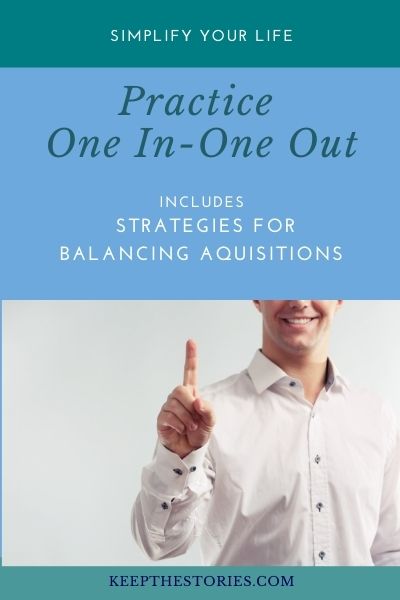Balance everything that you bring in to your life with something that you let go.
M.E. O’Toole
Balance Acquisitions
For everything something ‘new’, let go of something ‘old’
One of the recurring themes in this challenge is that simplifying your life requires you to be intentional about what you choose to keep in your life.
Everything you own should serve a purpose, which might mean simply that it brings positive energy to your home. However, ensuring that all your possessions are helping make your life better requires careful assessment of what you choose to acquire.
It also involves making some decisions that will help you avoid refilling spaces that you have cleared. This includes assessing current possessions before acquiring new ones to avoid duplicating things that you already own, a process that can be especially challenging if you are someone who loves to shop or can’t resist a good bargain.
Shop With Intent
Asking a few questions before purchasing can help stop duplication before it even makes its way into your home :
- Is this a replacement or duplication for something I already own?
- Does it meet a need or a want? (A choice is not automatically wrong because it is a ‘want’ but stopping to consider the question can help you shop more thoughtful picks)
- Will I use this item often? Does it complement what I already have in my closet?
- Is it a style that will last?
- Is it high quality? Is it made to last?
Reviewing a checklist (yours might look different than mine!), encourages you to evaluate the purchase before buying. In addition, it reminds you of your goal to simplify and be intentional with choices.
Practice One In – One Out
If you decide to purchase after asking your checklist of questions, apply the One In, One Out approach to prevent clutter from accumulating.
As the name suggests, One In-One Out is the practice of balancing everything you bring into your home with one thing going out. You donate or sell an item that serves the same or similar purpose for every purchase. The key is to remove the outgoing item shortly after acquisition. You might even choose to reverse the steps and follow the practice of One Out – One In, which prompts you to get rid of one current possession BEFORE you acquire something new. The principle is the same, but the mindset can be different, and you might prefer to see an acquisition as an award or filling a need, which can also help you be more intentional. Choose whichever feels a stronger motivator for you in a particular situation.
Compare Your Closet to a Suitcase
Deciding what and how much you need can require a change of mindset. For example, think about how you prepare to travel. You probably pack your favourite or most practical clothes and basic supplies you anticipate needing when you are away from home. Packing for a trip can emphasize how little you really NEED to be comfortable. Of course, you will have many things that you wouldn’t pack for a trip – sentimental things, books and blankets, kitchen tools, art supplies, and other things that make your house a home – but there are valuable lessons to learn from the exercise of packing. Everything you include in your bag takes up limited space and adds weight to what you have to carry. Each item you include means another thing that you will have to leave. Applying this same approach to the limited space in your home is the foundation of the One In – One Out strategy.
Commit to donating, selling or giving away one item for every one that you bring in. For example, if you acquire a new jacket, make a space for it by removing something from your closet. Chances are you probably have something that is not getting a lot of love or wear and could better serve someone else. Remember the idea of packing your suitcase. Something has to come out before you can add another item.
This approach works for any category from clothes and accessories to kitchen gadgets to bedroom sheets to fabrics for your quilting stash; and any other collection that is a potential collection magnet for you (Name and Tame Your Clutter Magnets).
The Benefits
There are many advantages to this approach.
Stay on Track
The biggest benefit to this system is maintaining your progress. The hardest part of decluttering tends to be removing years’ worth of possessions to get down to those that are most meaningful. Applying One In – One Out allows you to maintain momentum and avoid backsliding.
Make Purposeful Choices
Another benefit to One In-One Out (or One Out-One In) is that it reinforces intentional decision-making. Deciding to donate or sell an item when you acquire something new makes you more likely to evaluate that decision.
Be Confident in Decisions
When you are more thoughtful about your choices, you are less likely to make impulse buys or to regret your selections You can save yourself stress, money, and time when you feel more secure in your purchasing decisions.
Take Action
Whether you choose to focus on One In-One Out or on One Out-One In, this is a robust process for preventing clutter from rebuilding in your home.
Challenge Questions for Day 26
Do you practice this principle? If so, which emphasis works best for you?
Declutter Challenge for Day 26
Balance One In with One Out
Remove one item for a recent purchase that duplicated something you already owned or something that served the same purpose. If you have already applied this practice, challenge yourself to find another recent acquisition for which you have not had a balancing step of taking something OUT of your house.
Try the reverse process too. Do you have something that you have been wanting to bring into your home? Before you add the new (or new-to-you) object, apply One Out – One In and pass something similar on to a new home to make space.



0 Comments